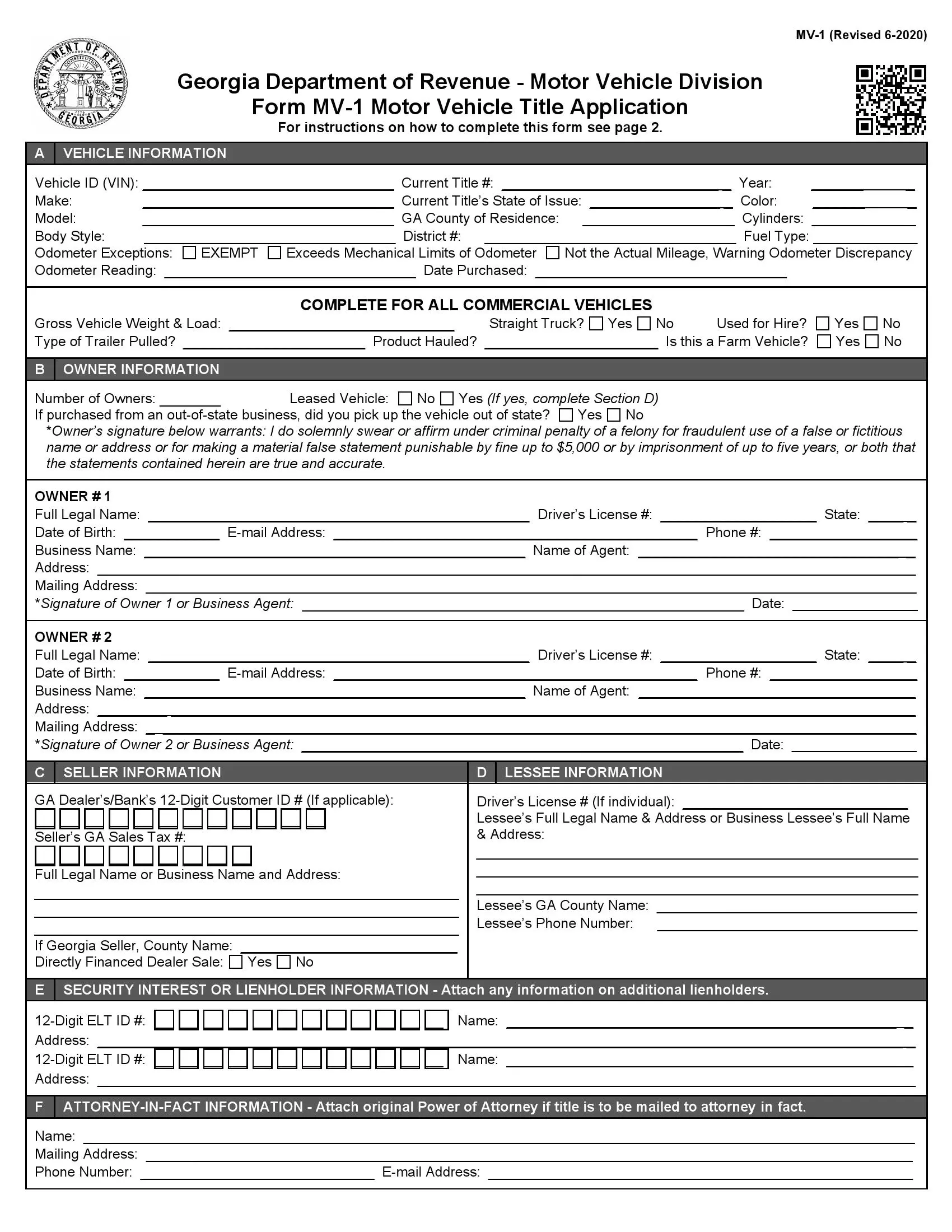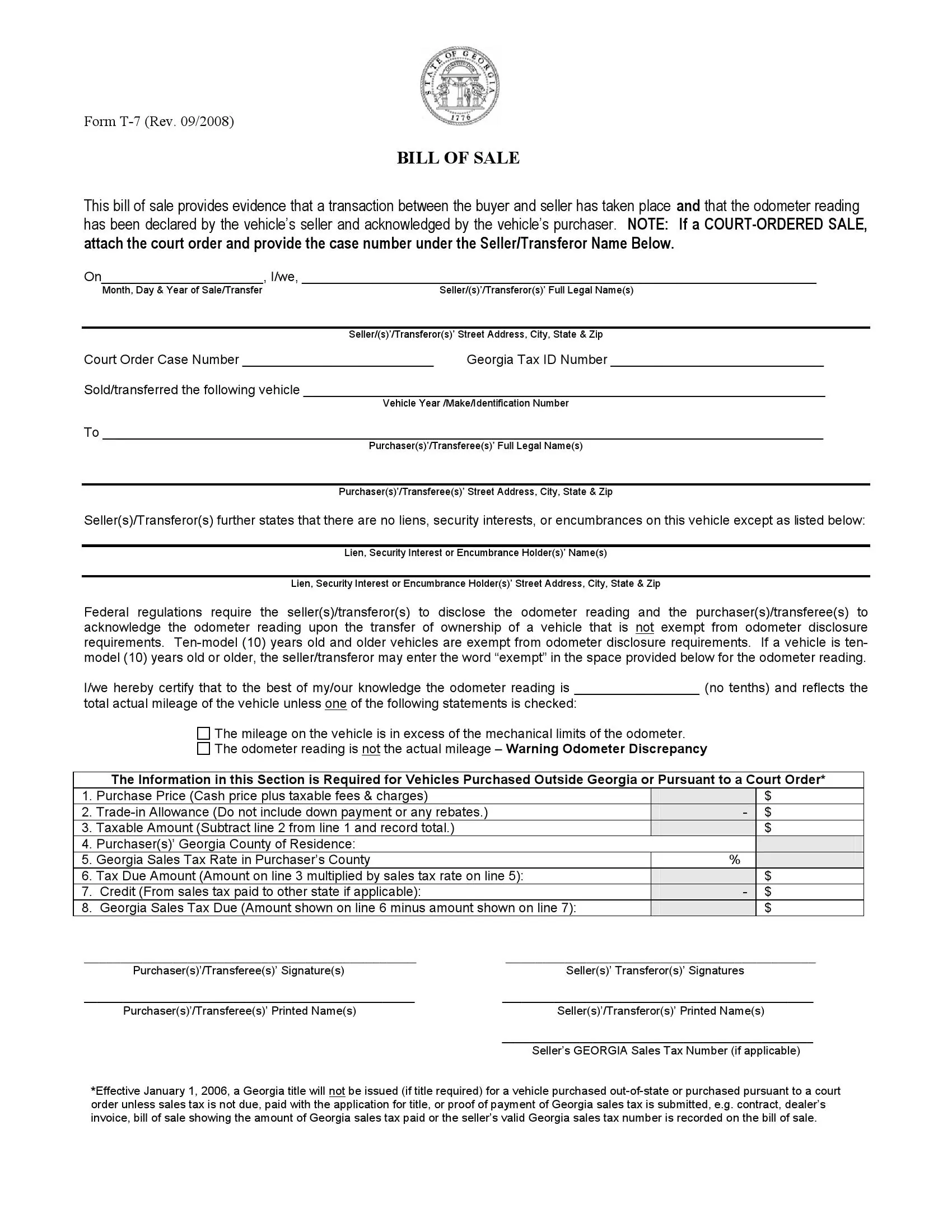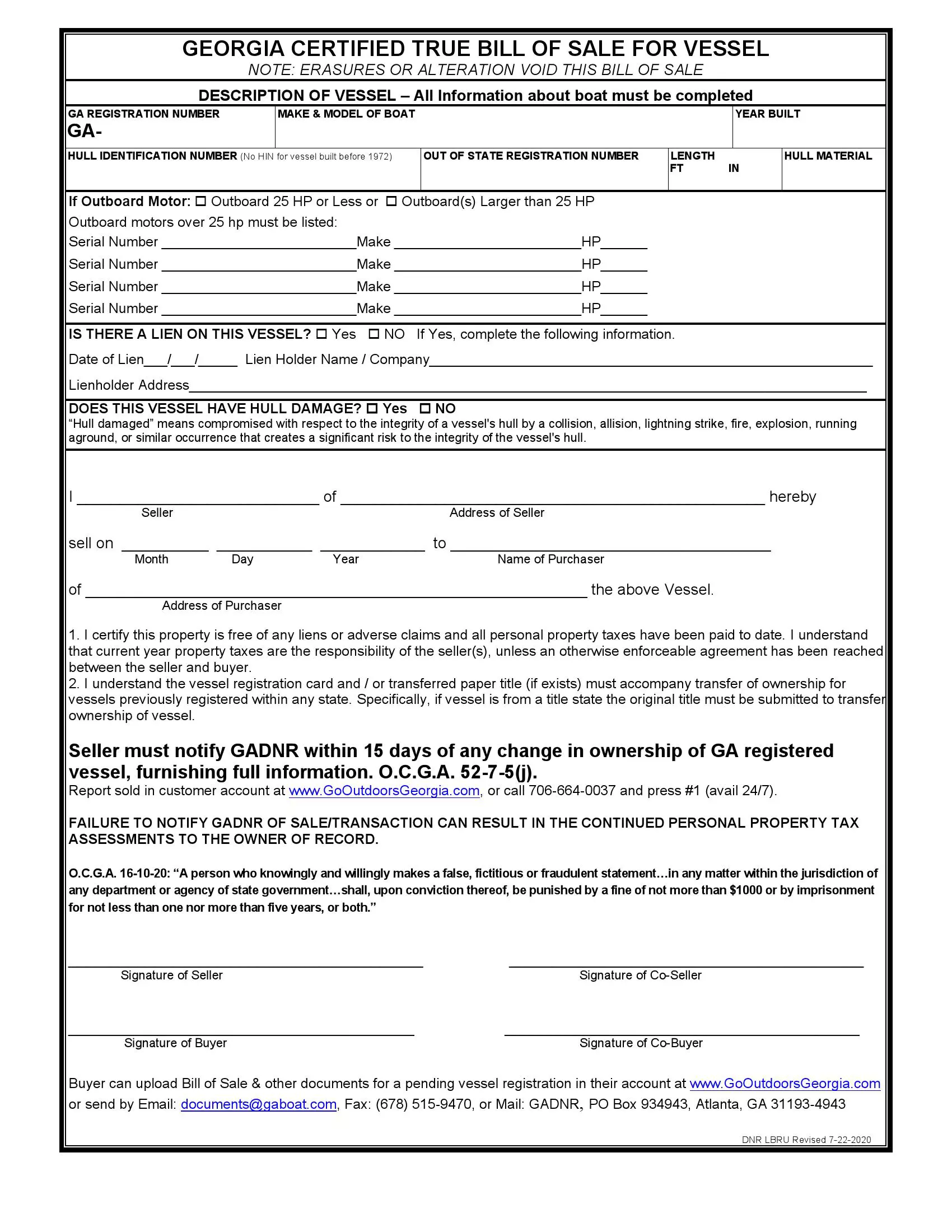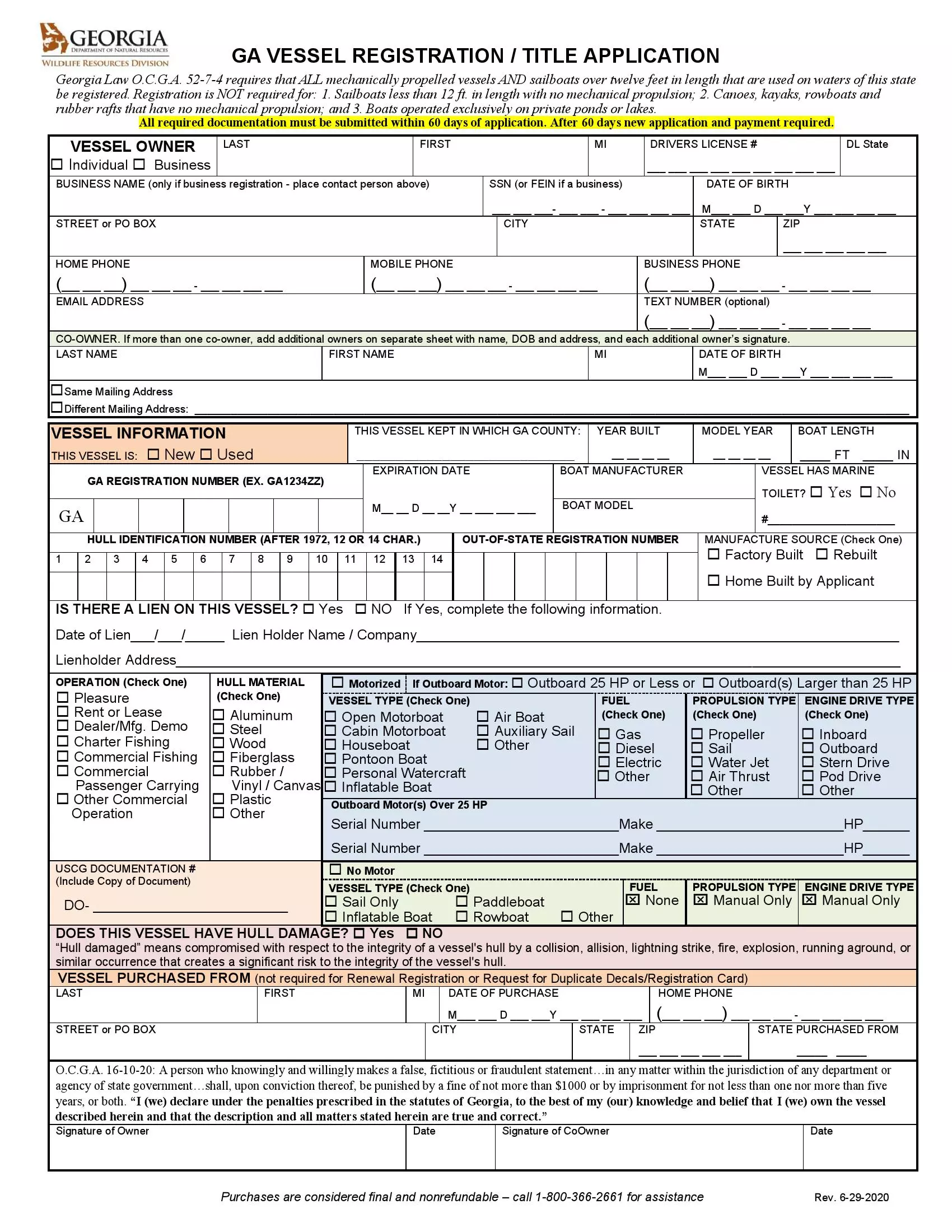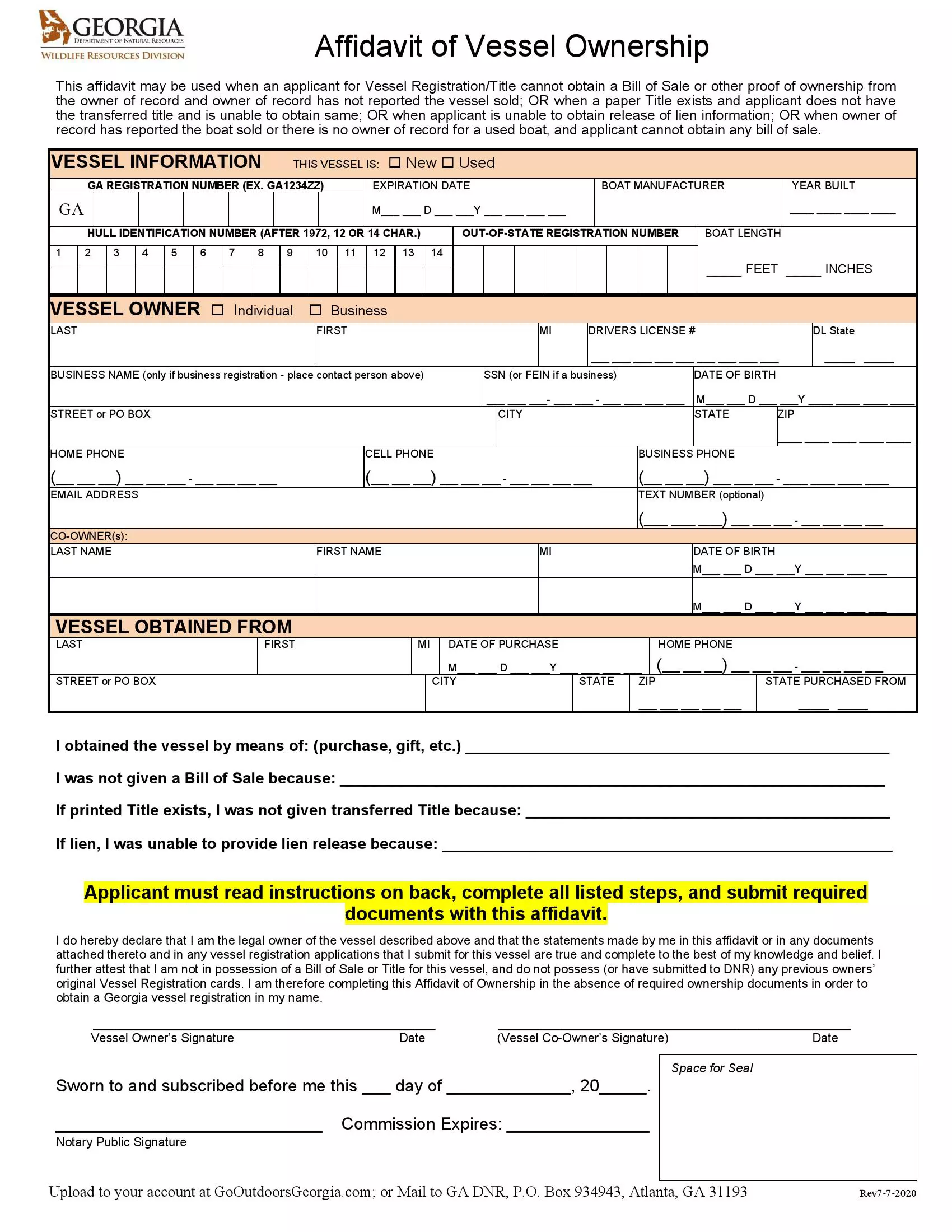Georgia Bill of Sale Form
Georgia bill of sale is a document that defines the terms of the deal between a seller and buyer. Whether you sell your personal property or buy an item, this document will protect you and exclude any risk regarding the transaction.
Bills of sale are used for different purposes, like selling or buying a vehicle, boat, gun, or cat. Each form contains specific terms applicable to particular circumstances, so choosing the one appropriate to your situation is essential.
You are free to use our printable form as an easy and straightforward template for your transactions.
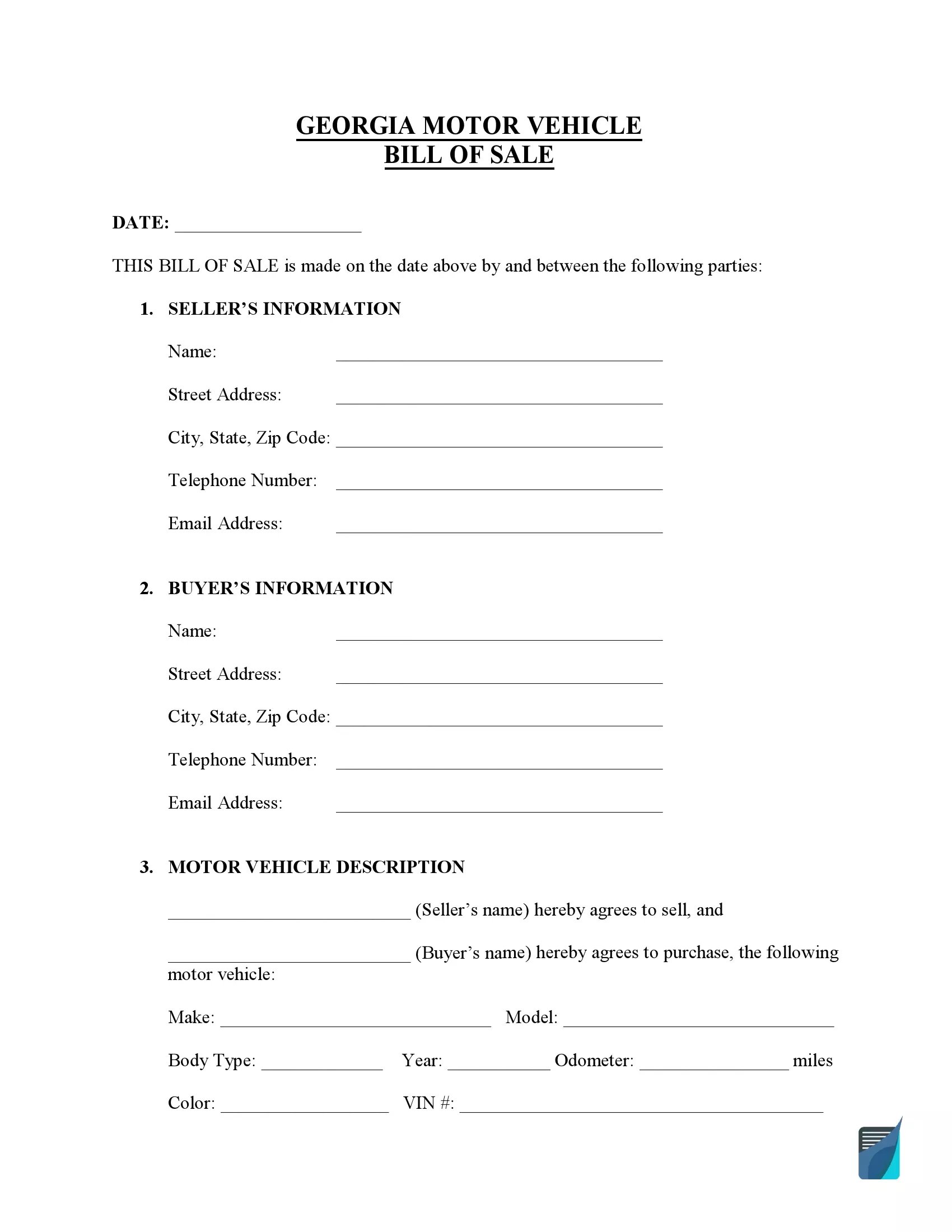
Build Your Document
Answer a few simple questions to make your document in minutes
Save and Print
Save progress and finish on any device, download and print anytime
Sign and Use
Your valid, lawyer-approved document is ready
Document Details
| Document Name | Georgia Vehicle Bill of Sale Form |
| Other Names | Georgia Car Bill of Sale, Georgia Automobile Bill of Sale |
| DMV | Georgia Department of Revenue |
| Vehicle Registration Fee | $20 |
| Bill of Sale Required? | Yes |
| Avg. Time to Fill Out | 7 minutes |
| # of Fillable Fields | 25 |
Georgia Bill of Sale Forms by Type
Depending on the circumstances and type of the sale, you will need to create a specific Georgia bill of sale form. Preparing the appropriate legal document is an essential step to make the transaction safe and successful. Each bill of sale contains particular terms (like the parties’ contact details and the item’s purchase price) and has a specific structure. So, you’re highly recommended to analyze the forms and select the applicable one before starting the process of selling and buying.

Georgia bill of sale for a motor vehicle is a crucial legal document to transfer vehicle ownership. It protects the purchaser from getting a vehicle with an unrevealed defect and the seller from partial liability in the event of any future accidents. Regional tax, registration fees, and other types of charges related to the transaction are usually on the purchaser.
| Alternative Name | Car Bill of Sale |
| Seller’s Signature | Required |
| Buyer’s Signature | Required |
| Notarization | Optional |
| Download | PDF Template |
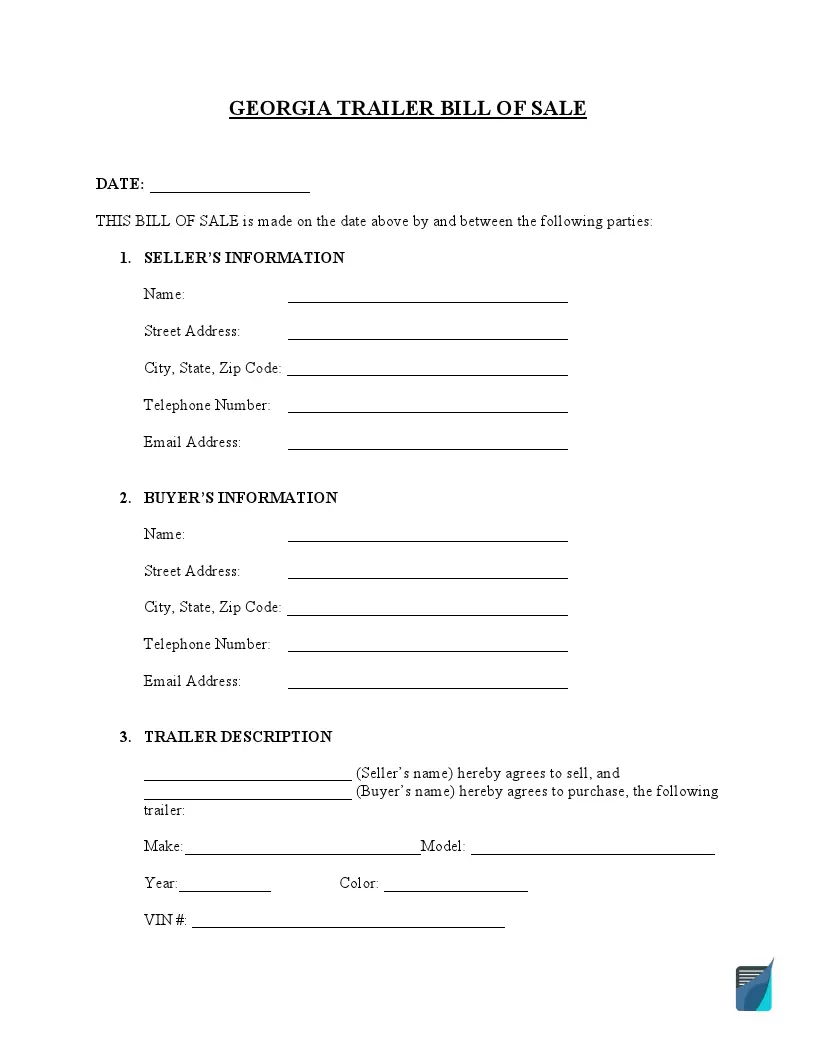
Georgia trailer bill of sale is prepared and signed by the parties of the transaction to prove a legal ownership transfer. This document is usually required to register a trailer in the Department of Motor Vehicles (DMV). Along with the bill of sale, you will also need to provide such documents as the driver’s license or ID card, proof of insurance, title application, and proof of ownership.
| Alternative Name | Utility Trailer Bill of Sale |
| Seller’s Signature | Required |
| Buyer’s Signature | Optional |
| Notarization | Optional |
| Download | PDF Template |
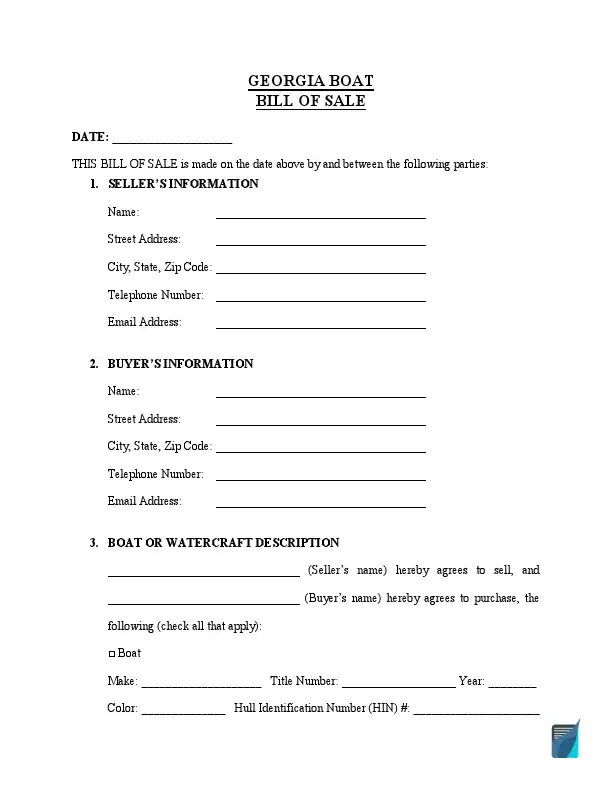
Georgia boat bill of sale confirms the details of the ownership transfer of the boat. Along with the Hull Identification Number (HIN), you will have to indicate such boat attributes as the model, make, year, and condition in your document. You may also need to provide a boat examination to verify the presence and appropriate condition of required safety equipment.
| Alternative Name | Vessel Bill of Sale |
| Seller’s Signature | Required |
| Buyer’s Signature | Required |
| Notarization | Optional |
| Download | PDF Template |
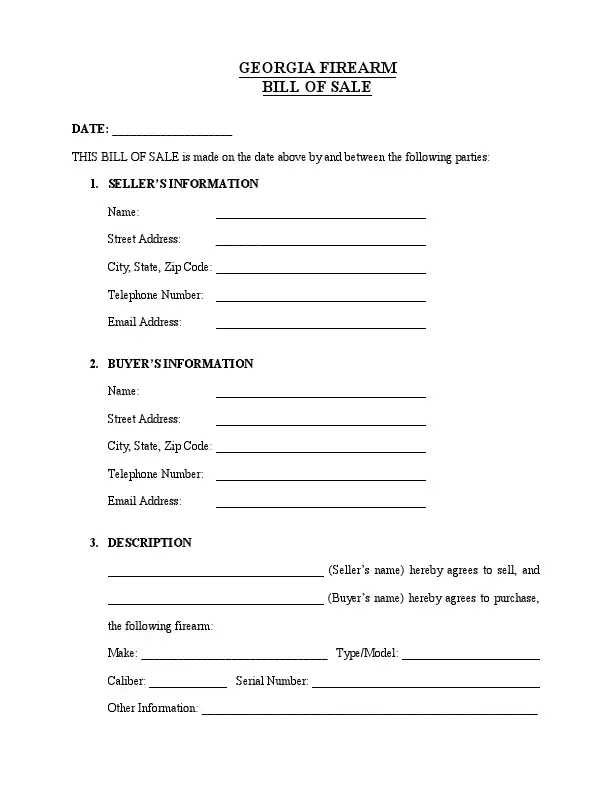
Georgia bill of sale for a firearm records the time and terms of a firearm ownership change. You do not have to go through a criminal record check or take other steps before selling or buying a gun in Georgia. But there’re a few things required to be mentioned on the bill of sale—the firearm caliber, model, and make, together with the individual information of both parties (including driver’s license numbers) and the cost of the gun.
| Alternative Name | Gun Bill of Sale |
| Seller’s Signature | Required |
| Buyer’s Signature | Optional |
| Notarization | Optional |
| Download | PDF Template |
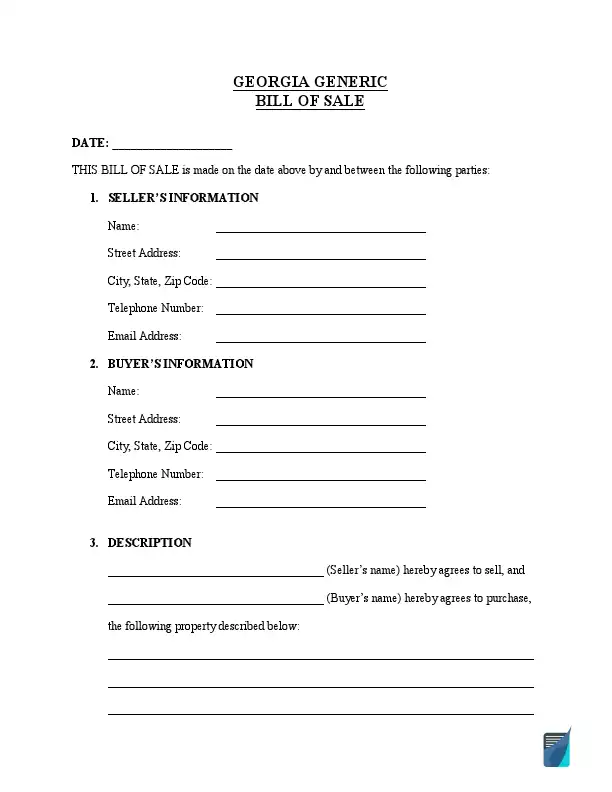
Georgia general bill of sale is used for almost all private transactions, but only if there is no specific bill of sale form. Otherwise, it’s highly recommended to use a bill of sale designed for your particular occasion. You may choose to prepare a general form when you’re selling or purchasing large and expensive equipment, machinery, or tools.
| Alternative Name | Generic Bill of Sale |
| Seller’s Signature | Required |
| Buyer’s Signature | Optional |
| Notarization | Optional |
| Download | PDF Template |
How to Write a GA Vehicle Bill of Sale
If you need evidence of the purchase or sale of a vehicle in Georgia, you can use the official bill of sale form. This document will establish legal ownership over the vehicle and help you during vehicle registration, title change, and other DMV-related paperwork. Here is how to complete this template correctly:
Step 1: Provide the seller’s information
First, the transferor fills out the date of the transaction, their full legal name, and physical address. If a court orders the sale, you must provide a court order case number. For any Georgia residents, it is also required to provide their tax ID number.

Step 2: Describe the vehicle
The following section is devoted to the vehicle description. You will have to provide such essential details as:
- Year of manufacture
- Make
- Vehicle Identification Number (VIN)

Step 3: Indicate the purchaser
Here, you are required to indicate the purchaser’s contact information, including their full legal name and address of residence (street, city, state, and zip code).

Step 4: Indicate the lien interest (optional)
Next, if there is any lien or security interest, the seller must list their holder(s)’ name and address.

Step 5: Disclose the odometer reading
The number you provide must reflect the total actual mileage. If there is a condition why you cannot provide the actual odometer reading, you need to check one of the statements that correspond to your case. It can be that the odometer’s mechanical limits are exceeded, or there is a discrepancy in the odometer reading.

Step 6: Fill out the section for vehicles purchased outside (optional)
If the vehicle is purchased out of the state, you need to provide information about the purchase price, tax details, and credits.

Step 7: Sign the document
Both parties must sign the document to confirm that they affirm and agree to the transaction. Signing the document is the final step required to establish legal ownership over the vehicle.

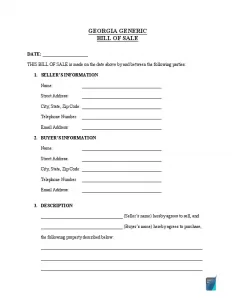
Registering a Vehicle in Georgia
Georgia laws require that all vehicles be registered within 30 days of buying them. All new Georgia residents or those relocating between its counties should register their vehicles within the same timeframe. Otherwise, they will face delay penalties. You can’t drive here if you are new until you have the state’s driver’s license and register your automobile.
You must register your vehicle at the nearest County Tag Office. There, you’ll need to fulfill the following requirements to complete your motor vehicle registration. Before visiting your nearest Georgia Tag Office, make sure that you:
- Complete the Georgia Motor Vehicle Title/Tag Application (Form MV-1);
- Bring your motor vehicle’s title;
- Have your state-issued driver’s license or identity card;
- Sufficient proof that you live in Georgia. For instance, you may need to provide a utility bill, lease agreement, or paycheck bearing your name;
- Proof that you have vehicle insurance from the state;
- An odometer to accompany your vehicle bill of sale template to prove its actual mileage and save you legal trouble;
- Be prepared to pay all the necessary fees (their prices vary).
A motor vehicle bill of sale protects the seller from all legal liabilities that could face the car after selling it. For example, if the motor vehicle gets involved in a road accident or receives traffic tickets, they won’t be held responsible.
The bill of sale also benefits the buyer in several ways. The form reminds them of a pending transfer that requires their participation, so they should be ready to fulfill their legal obligations within the stipulated period. And secondly, it reminds them that they don’t have any financial obligation to the vehicle’s previous owner because they have paid them.
Lastly, the form provides all the necessary description of the car. It describes the vehicle’s color, make, year of manufacture, and model. Also, it states if the car has any damage that could adversely affect or alter its fair market price.
Relevant Official Forms
Odometer Discrepancy Affidavit is usually attached to the bill of sale and certifies whether there are any discrepancies regarding the odometer reading.
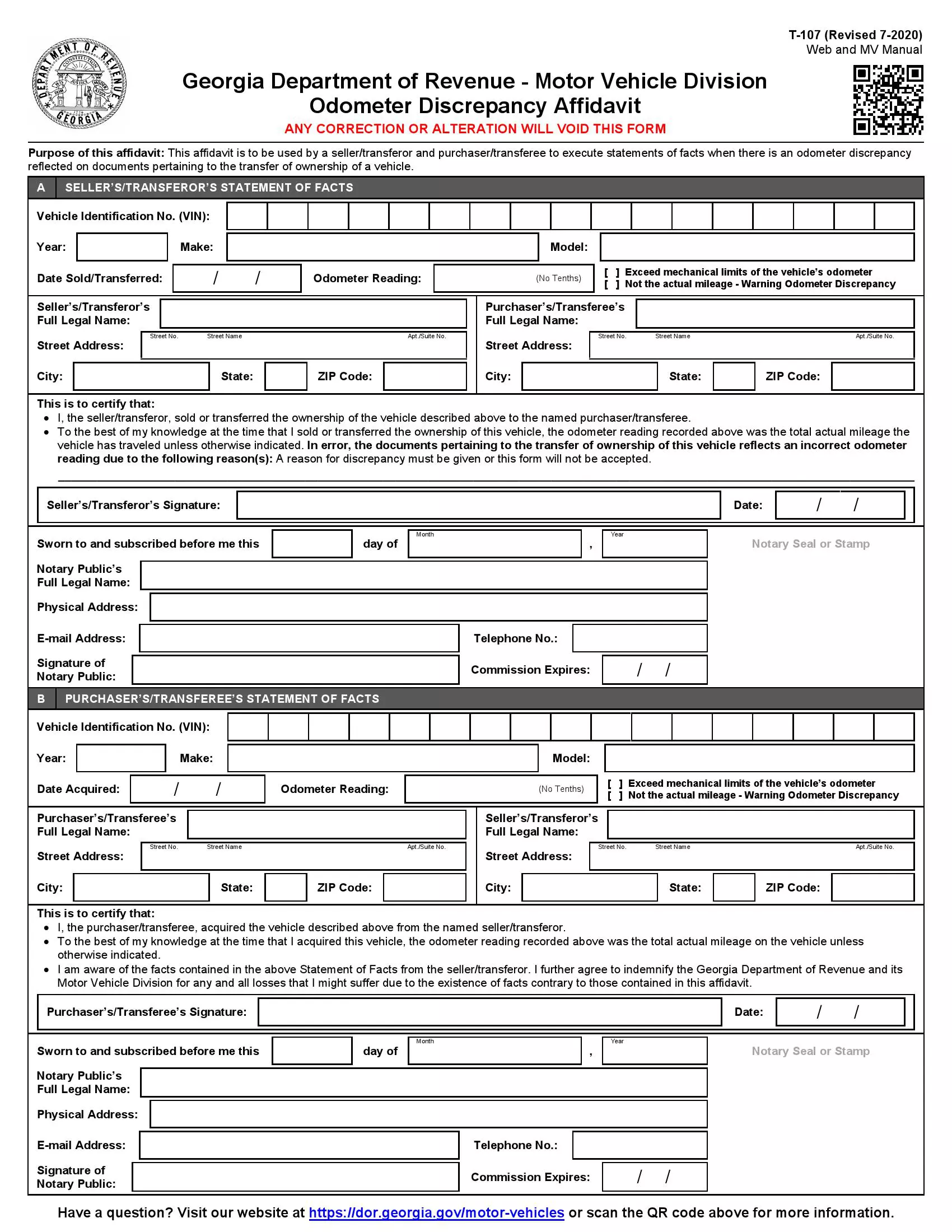
Certification of Inspection is used to inspect the vehicle registered in another state or country that does not issue titles.
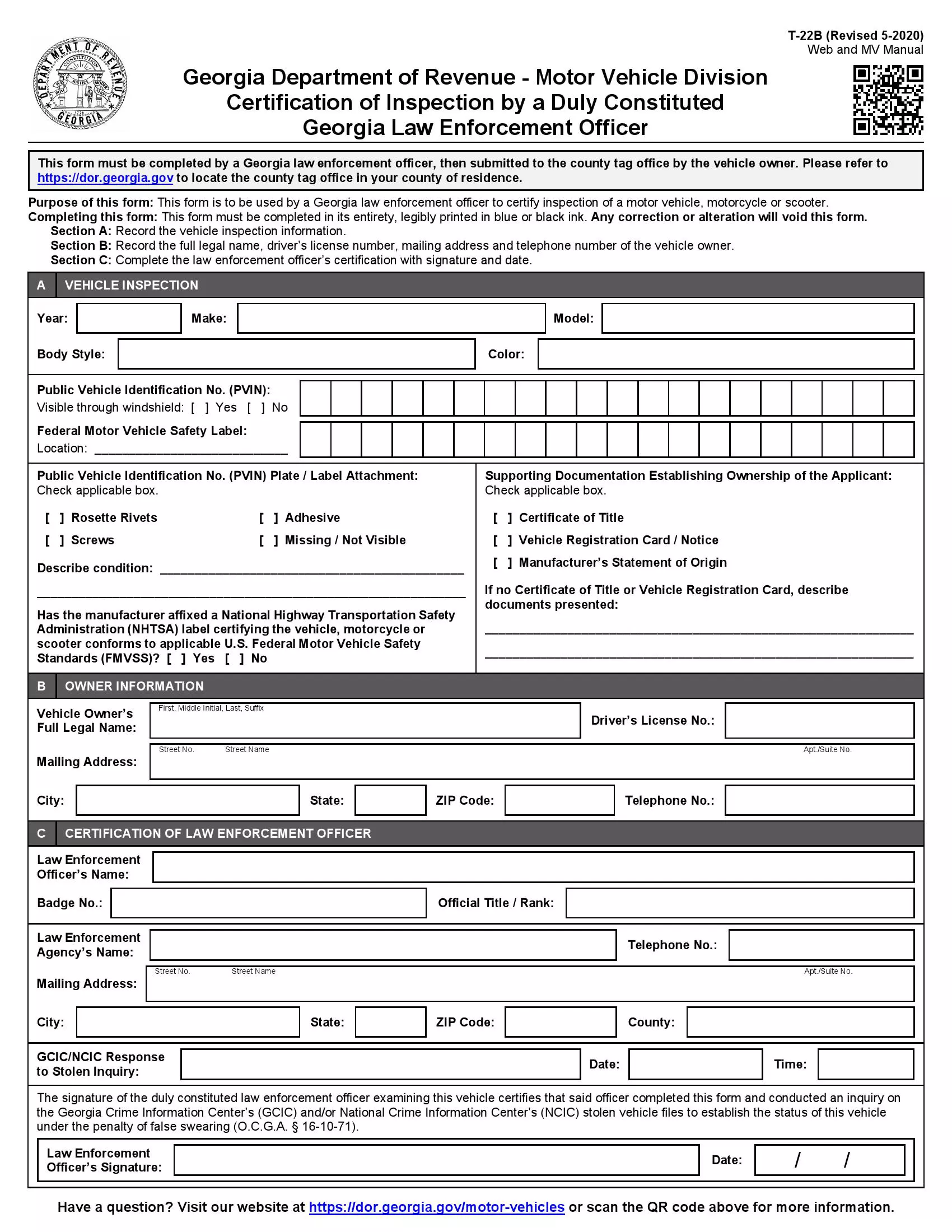
Application for Voluntary Registration Cancellation is used to cancel your registration if your vehicle is stolen, junked, or sold to a dealer.
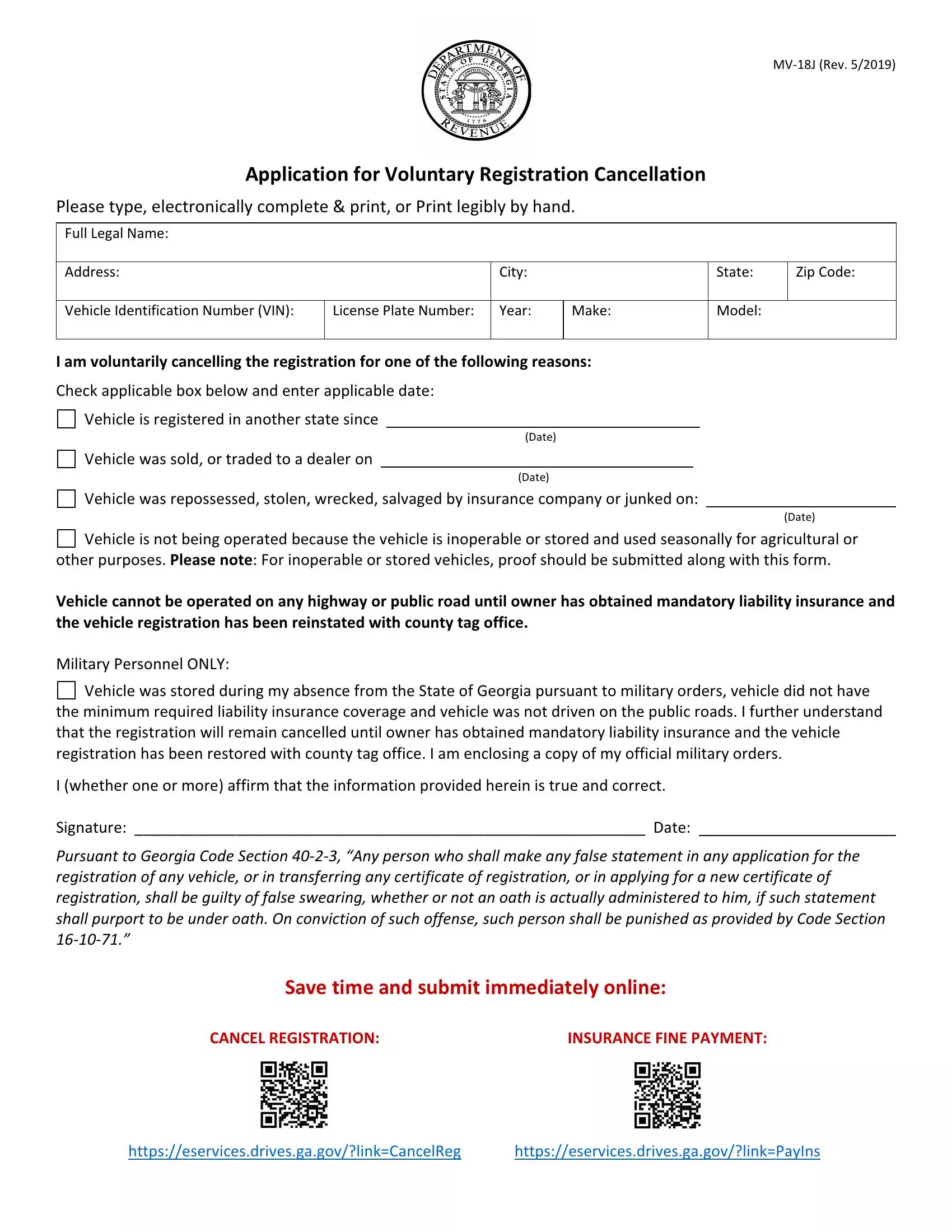
Used to apply for a firearm carry license in Georgia.
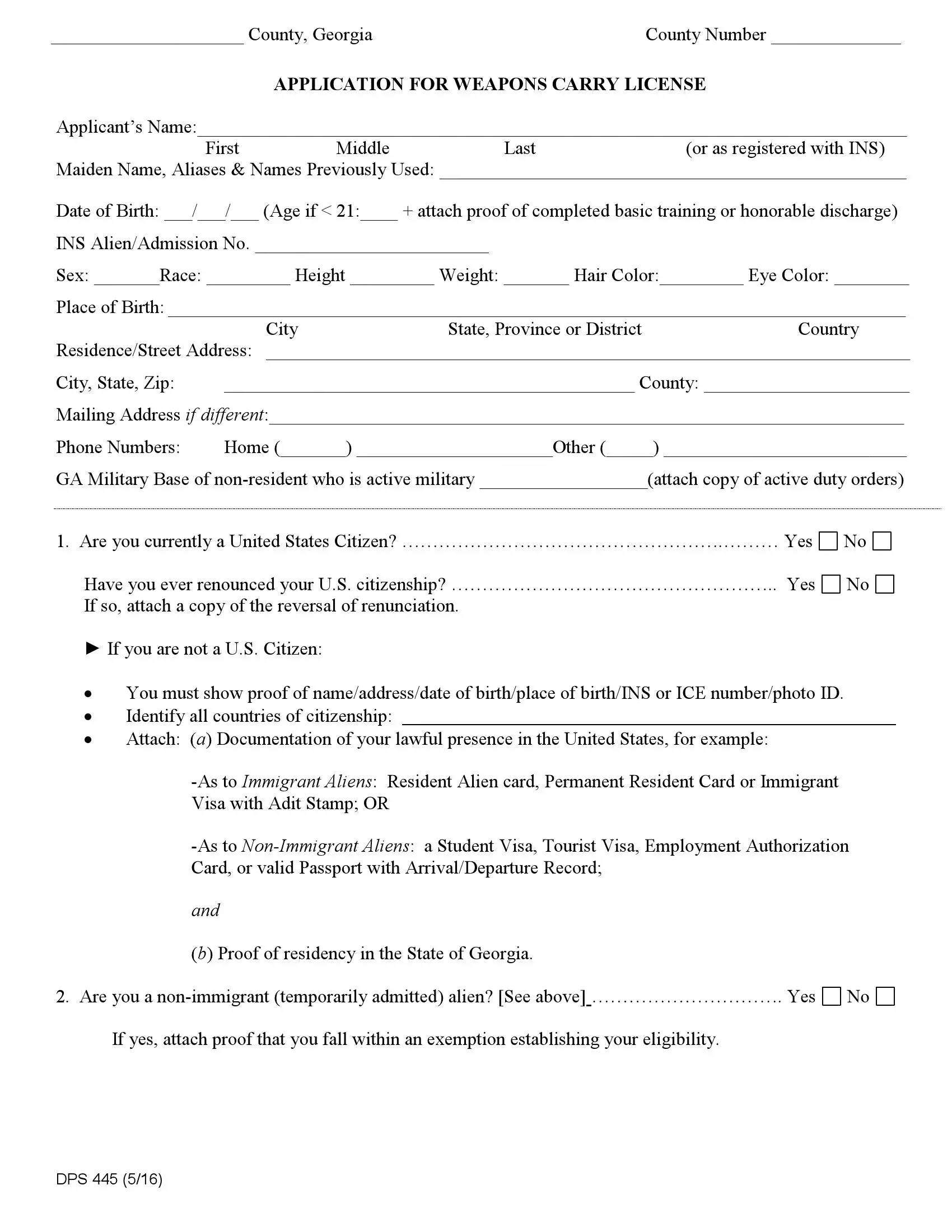
Short Georgia Bill of Sale Video Guide


